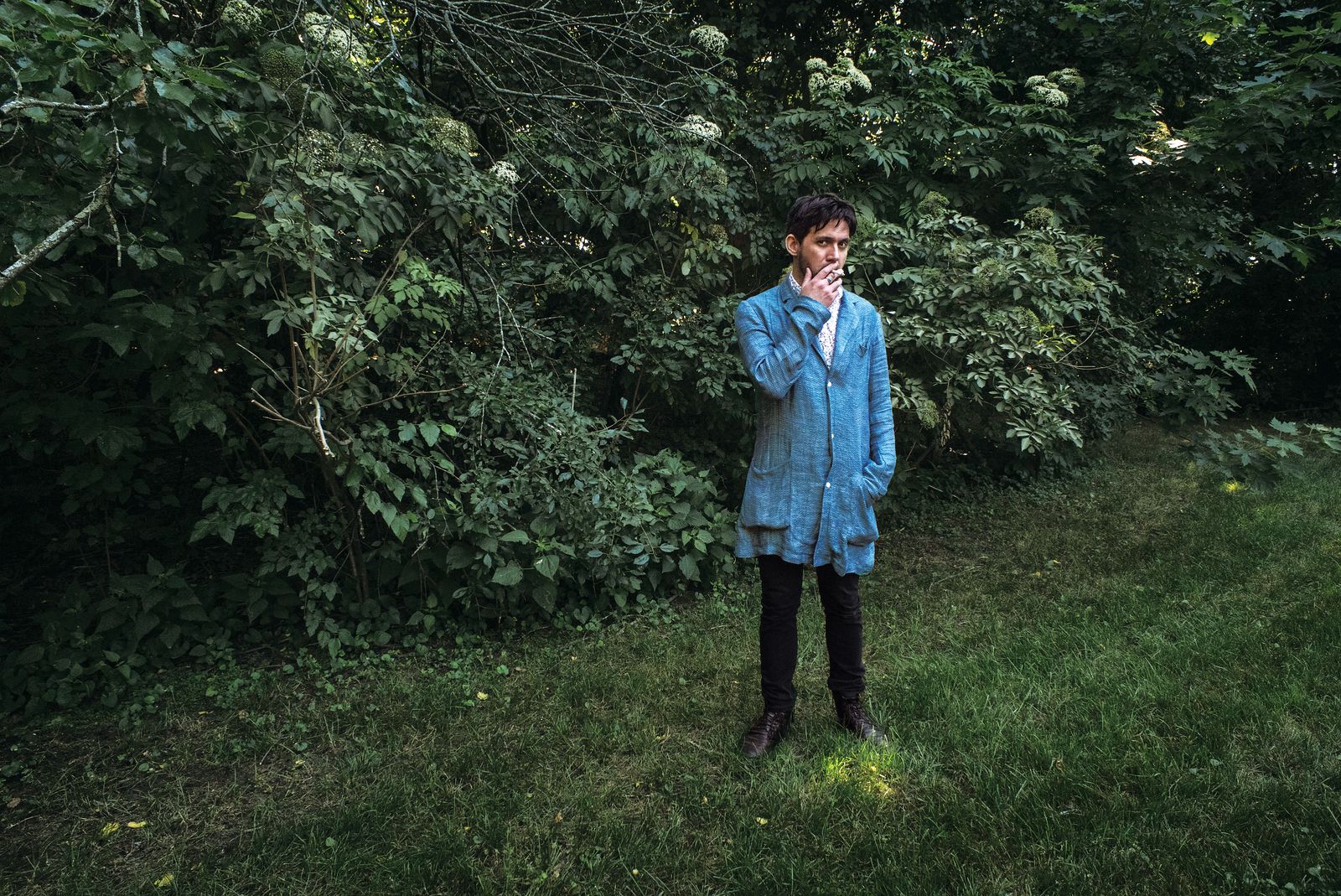I’m going to flip the record,” says Conor Oberst, rising from the sunken couch in his den to put on the second side of Willie Nelson’s The Sound in Your Mind. “I’m scared of silence.” This area in the singer-songwriter’s Omaha, Nebraska, home is known to Oberst and his wife, Corina Escamilla Figueroa, and their two roommates as “the fun room.” And it appears well lived in, with its empty cans of Busch Light scattered around the space, black shag carpet, boho furniture (there’s a vintage carousel horse in one corner), and assorted records dotting the floor. “We hang out in here a lot,” Oberst says, reclaiming his spot on the couch, across from a stack of photos he’s been signing for fans who preorder his new album, Ruminations. “Have a good summer,” he’s written on one; “Sorry about everything,” on another.
Oberst is 36 and shows some signs of rock-and-roll wear and tear. His dark hair has hints of gray; his fingers are nicotine-stained. In his denim vest, black jeans, and boots, mirrored Wayfarers hanging from the neck of his T-shirt, Oberst looks like an older but not particularly grown-up version of the sensitive boy wonder he was when he first emerged from the heartland a decade and a half ago, a persona subsequently name-checked in Jonathan Franzen’s Freedom as shorthand for privileged 21st-century idealism.
The whole vibe of this house, which matches Oberst’s current vibe in general, is that of a kid whose parents have been away for the summer and left him the credit card and the key to the liquor cabinet. “We do a lot of nightcap work,” Oberst says, gesturing out the sliding glass doors to another building, visible over the backyard fence, where he and Mike Mogis, a longtime friend and collaborator, write and record. “Mike mixes until two in the morning. Then he’ll text me to see if I’m awake, and I’ll go up there, too.”
Omaha is Oberst’s hometown. He grew up in a leafy neighborhood not unlike this one, listening to his older brother’s Smiths records, soaking up what he could from the one decent record store downtown, and recording his first album at 14. In 1998, he released his debut full-length with Bright Eyes, and in the years since, he’s put out 14 studio albums with that band; his punk band, Desaparecidos; and Monsters of Folk, the group he formed in 2009 with Mogis, folk musician M. Ward, and Jim James of My Morning Jacket, plus assorted EPs and live releases.
But until Oberst crash-landed here late last year, at the end of an emotional and physical tailspin that began in late 2013, when a fan falsely accused him of rape, culminating in his being hospitalized, he hadn’t lived full time in Nebraska since his early 20s. He hasn’t made an album like Ruminations since then, either. “It’s truly just me playing by myself,” he says of the ten austere tracks, written and recorded on a whim while snowbound last winter. “When I first heard the demos, I was a little worried,” Mogis says. “I could hear how emotionally distraught Conor was.” After Nonesuch Records releases Ruminations, Saddle Creek, the label that Mogis co-founded, will put out early Bright Eyes recordings in a comprehensive boxed set of that band’s work, The Studio Albums: 2000–2011. Which means that this fall, as Oberst fans reimmerse themselves in the plaintive and emotionally harrowing songs that first made him famous, they will also be getting to know a new collection of similarly raw tunes written during one of the most difficult periods of the singer’s life. Meanwhile, the object of their attention, with the exception of a few dates at blue-chip venues like Carnegie Hall and the Ryman Auditorium in Nashville, plans to stay right here on this couch, drinking beer, listening to records, and hanging out with kids he’s known since high school. “I paid rent in New York for 13 years, and I own a house in L.A.,” he says a little wistfully. “But I don’t really know where my scene is.”

From the outset of his career, Oberst has inspired the kind of intensely devoted fandom that’s more common with boy bands and pop stars than confessional singer-songwriters. In the early years, as Bright Eyes and Saddle Creek were becoming internationally known, Oberst would go over to his parents’ house and find his mom sitting out front serving lemonade to kids who had tracked down his home address and driven cross-country to visit him. In 2003, the first time Oberst played Letterman, a local journalist showed up at the family home expecting to watch with the musician’s parents. “My grandpa was a pediatrician, and for years his name was in the phone book,” Oberst says, reaching down from the couch to pet one of his dogs. “His phone would ring all the time at one in the morning. ‘Hello, is Conor there?’ ” The attention could, and did, take more sinister turns. A few years ago, a woman came up to Oberst at a restaurant and punched him because he didn’t take a photo with her friend. “She was really wasted,” Oberst recalls charitably. “But she cold-cocked me. Closed fist to the face.”
Oberst has always been a little afraid of his admirers. He says they sometimes express a feeling of “weird betrayal” when he doesn’t meet their expectations, both creative and personal. “I’m sure it’s not on the same level,” he says, referring to the pressure many women in the music business feel to fit a standard aesthetic, “but I can relate to being objectified,” he says. “To being treated like, ‘If you’re not what I want you to be’ — ‘I’ being the critic, the fan, the observer — ‘then you’re shit.’ ”
That sort of negative attention spun out of control in December 2013. A woman calling herself Joanie Faircloth wrote in the comments section of an xoJane piece (about the writer’s abusive relationship with a rock star) that Oberst had raped her (after a concert in 2003). And — as surreal as it was to have been the crush of many straight millennial feminists, only then to be demonized and become the unintentional hero of men’s-rights groups — given Oberst’s long-standing wariness of fans, to him it felt like a reckoning. “I associated creativity and what I put out into the world with this traumatic experience,” he says. “I associated being vulnerable with people being able to say a bunch of crazy shit about you.”
Faircloth (whose real name is Joan Elizabeth Harris), a then-26-year-old North Carolinian, initially came off as sympathetic. But as her accusations gained attention, her credibility came into question. There was confusion about the details of the alleged incident, and witnesses, including ones Faircloth herself named, said she was never anywhere near Oberst on the night she claimed the event had taken place. (From the outset, Oberst vehemently denied the accusations.) Over time, other parties came forward claiming Faircloth had an extensive history of misrepresenting herself online. But for more than six months, this was all being adjudicated in the blogosphere’s court of public opinion.
“I shed some tears in a couple hotel rooms,” Oberst says with a pained smile. We’ve left his home for happy hour at Pageturners Lounge, a onetime bookshop turned bar in East Omaha, that the singer co-owns. He’s pouring rosé and remembering life in the midst of these accusations. In the winter of 2014, after continued silence on Faircloth’s part in response to attempts from Oberst’s lawyers to make contact, he sued her, on the advice of his counsel, which of course enraged victims’-rights advocates. “And then to go on tour … ” He takes a sip of wine. “I had some weird thoughts. Just going out there, literally feeling like, Are people going to kill me tonight? Is someone going to fucking shoot me? But you have to do these shows, because it was like, if you quit, you’re guilty.” Mogis notes that during the ordeal, his friend was uncharacteristically “always checking online because he was concerned what people thought. He was like, ‘How can people think I’m this sort of person?’ ”
The album he was promoting at the time, Upside Down Mountain, earned some of the worst first-week sales of his career. Numerous major outlets declined coverage of Oberst, according to his publicist, because of the scandal or because Oberst was not willing or legally able to discuss the situation. The Daily Nebraskan published a column in which the writer urged readers to stop buying Bright Eyes records.
Then on July 14, 2014, Faircloth recanted. “The statements I made and repeated online and elsewhere over the past six months accusing Conor Oberst of raping me are 100% false,” she wrote in a statement signed in front of a North Carolina notary public, then posted and widely disseminated online. “I made up those lies about him to get attention while I was going through a difficult period in my life.” But for Oberst, the damage was done. Stories about the false accusation still show up prominently when you Google his name.
Oberst says of the days following Faircloth’s retraction, “I might have just quit for a while right then, but the way timing worked out, Desaparecidos was already out of the station.” The punk band had released only one album, 2002’s Read Music/Speak Spanish, an impassioned screed about the evils of suburban sprawl, before going on indefinite hiatus. As Oberst became increasingly enraged by the number of anti-immigration laws being passed across the country, Desa, as he calls it, got together again for occasional shows beginning in 2010. “I was a little more sensitive because of Corina,” he says, referring to his wife, who is Mexican. In 2015, the group released a second album, the fiery Payola. At the time, Desaparecidos seemed like a safe and perhaps even productive way for Oberst to channel his emotions. “It was good because it got me doing something,” he says. “And lyrically it wasn’t about me at all.” But in retrospect, he says, he was just trying to “outrun” the Faircloth nightmare. Which, on a day off in Florida last October, finally caught up with him.

Oberst had been feeling faint on the road, so a doctor was called to check his vitals. “You have crazy-high blood pressure,” Oberst remembers the doctor saying. “I’m recommending that you go to the hospital.” A CT scan led to an MRI, which led to “the dude basically saying, ‘Your brain looks weird.’ He was throwing out terms like pre-dementia.” Desaparecidos canceled their remaining dates, and Oberst checked into the Mayo clinic. “Long story short, and happy ending — they’re like, ‘You have a cyst in your brain,’ ” he says, noting that for the moment it’s nothing to worry about. “It’s probably been there my whole life.” His high blood pressure, though, remains a problem. “Now I’m taking medicine for that and taking happy pills to feel less stressed out.”
After a post-cocktail-hour dinner of pizza and salad at a nearby restaurant, Oberst and I are back at Pageturners, where he pulls out a pack of menthol American Spirit. A classic Great Plains thunderstorm has broken the soupy heat, and suddenly it seems like every kid in Omaha with tattoos and dyed hair has arrived to wait out the rain. As it often does with Oberst, the conversation turns to politics. “Hell, yes!” he says when I ask if he’s worried about Trump. “I want everyone to be scared and show up to vote.” Oberst had been a Bernie supporter, but he’s decided to be pragmatic. “I had a knock-down-drag-out fight with a friend who’s Bernie-or-bust,” he says. “I’m like, ‘You’re acting like a fucking child.’ ” It’s this side of Oberst — the side that, in 2005, wrote a searing talking-blues takedown of George W. Bush, “When the President Talks to God,” and campaigned vigorously for Kerry and Obama — that made him leave Nebraska in the first place. “I mean, I don’t necessarily have the best rep in town,” he says of Omaha. “I’ve been pretty outspoken politically, and some people just don’t like the cut of my jib.”
At this point, perhaps it doesn’t really matter where Oberst lives; he’s become a member of the wandering creative class, with the famous friends to show for it. Back at his house, he’d told a story about hanging out with Paul Thomas Anderson in “the whirlwind” of his friend Joaquin Phoenix, and he speaks with boyish excitement about having been invited to fellow Omaha resident Alexander Payne’s apartment a few years ago to watch an early screening of the director’s The Descendants. But it does seem like he felt compelled to come back to the simplicity of home after such a disorienting couple of years. Or maybe it’s just that a part of him never left. “My favorite feeling is when you finish a song,” Oberst says of the time he spent here, working alone. “Where there once was nothing, now this thing exists.”
*This article appears in the September 19, 2016, issue of New York Magazine.
